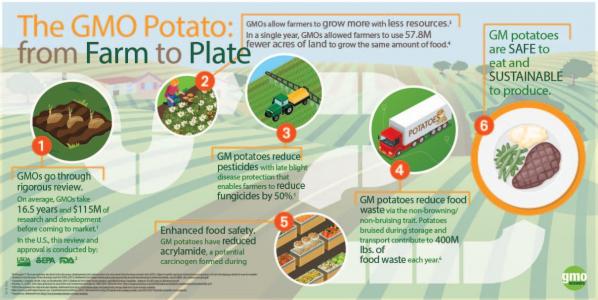Question
In what ways can GMO crops benefit societys health?
Submitted by: Sergio Avila
Answer
Expert response from Community Manager
Moderator for GMOAnswers.com
Friday, 25/01/2019 21:46
GMOs have had a positive impact on society’s health in multiple ways, including advancements in food waste reduction, sustainability, and food security. Although there is a long list, we have boiled it down to 4 main points.
4 Ways GMOs Benefit Society’s Health
1. GMOs can increase the health and nutritional benefits of our food
Rice is an important staple food source for more than half of the world’s population and accounts for between 30-72% of the energy intake across Asia alone. GMO rice, or ‘Golden Rice,’ which gets its name from its yellow color, is more nutritious than rice that isn’t genetically modified since it’s packed with beta-carotene, a rich source of vitamin A. Vitamin A Deficiency is a known cause of death and blindness in the developing world – one which ‘Golden Rice’ can help address. Recently, the U.S. FDA approved Golden Rice – marking the third positive international assessment of this GMO crop and taking us one step closer to helping the people who need it most.
Genetically modified high oleic soybeans with an enhanced oil profile, much like olive oil, have been developed and are longer lasting and trans-fat free. Another example is the Innate potato that has lower levels of asparagine, which when heated, turns into acrylamide, a probable carcinogen.
2. GMOs help reduce food waste
Through a variety of options, GMOs can help reduce food waste and loss. According to the Food and Agriculture Organization, globally, almost half of all fruits and vegetables are wasted every year, including 3.7 trillion apples. GM apples are non-browning, eliminating those superficial issues that cause people to unnecessarily throw them away.
To learn more about non-browning apples and how they reduce food waste, we encourage you to watch this video.
3. GMOs reduce agriculturally related greenhouse gas (GHG) emissions.
Agricultural economist Graham Brookes reports that since the first widespread commercial use of GM crops in the mid-1990s, GM technology has, “facilitated important cuts in fuel use and tillage changes, resulting in a significant reduction in the release of greenhouse gas emissions from the GM cropping area. In 2015, this was equivalent to removing 11.9 million cars from the roads.”
4. GMOs conserve water.
Farmers utilize many tools to conserve water, including drip irrigation systems and conservation tillage practices. GMOs provide another tool that farmers can employ to help conserve water. Herbicide tolerant GM crops along with conservation tillage aid in soil moisture retention, which can reduce the need to irrigate. But, GMOs can help reduce water use in another way – drought tolerance. This GM trait can help crops cope with stress and yield more when periods of drought occur– without supplemental water from irrigation.
5. GMO technology also has potential to improve the lives of millions in the developing world.
Jim Gaffney, Strategy Lead for Biotech Affairs and Regulatory at DuPont Pioneer, provides this insight:
“While serving in the Peace Corps in Cameroon, Central Africa and more recently in business travel to Africa, I’ve observed the difference that technology can make. The average yield of U.S. maize is 165 bushels per acre; the average yield for the African continent is closer to 20 bushels per acre. We can do better in Africa and in most other geographies. GMO technology is one tool to help us get there while enabling farmers a chance at greater sustainability, prosperity, health and nutrition, benefits which have positive and far-reaching ripple effects for all of society.”
As outlined in a study published in 2016 in World Development, farmers in South Africa benefit from yield increases and reduced applications of pesticides with GM maize varieties. The weed control benefits, in particular, are valued by female farmers who most often are tasked with the difficult and time-consuming activity of hand-weeding.
We hope this answers your question, if you have any other questions about GMOs or biotechnology, please ask here!
What Are GMOs?


